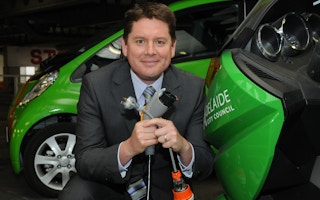Adelaide’s tourist hot-spot, the Central Market, now boasts an innovative clean energy charging station for the city’s electric vehicles.
The Adelaide City Council and the South Australian Government have teamed up with ChargePoint Australia and Ceramic Fuel Cells Ltd to showcase a new charging station that is powered by low-emission fuel cell technology rather than the region’s electricity grid. The station can charge two vehicles at a time and is free of charge.
“This initiative reinforces the City of Adelaide’s role as a leader in environmental sustainability and new technology,” said Adelaide Lord Mayor Stephen Yarwood on Monday as the station was announced.
The system,called BlueGen, will be able to generate at least 12,500 kilowatt hours of clean electricity each year. Excess power not required for vehicle recharging will be fed into the grid.
Brendan Dow, Managing Director of Ceramic Fuel Cells, the company that developed the system, said that BlueGen is an ideal companion technology to electric vehicles. “We think BlueGen is an ideal “enabler” of EV charging stations, so we’d like to do more similar installations,” he said in an e-mail interview with Eco-Business.
About 25 BlueGen units are currently in operation around the world, with the biggest market being Germany. This is the first unit installed in South Australia and the first curb-side EV charging application. Mr Dow says that the units’ biggest growth potential is with small-scale stationary power generation such as in homes and commercial buildings.
Early users of electric vehicle charging stations are few in number. They consist primarily of government and corporate fleets. But with electric vehicles poised to enter the mainstream, many more customers will be seeking ways to charge their vehicles.
Adelaide has a number of charging stations already in place, all of which are powered by the electricity grid, which in Australia means primarily energy from highly-polluting coal. Many of the stations have been installed by ChargePoint Australia, an Australian company that provides infrastructure for charging electric vehicle batteries in homes, businesses, shopping centres and at curb-side bollards.
James Brown, chief executive officer of ChargePoint, is seeing an increase in use of the charging stations in recent months as awareness and availability of electric vehicles grow. He estimates the number of electric vehicles on Australia’s roads to be in excess of 500.
“The projections of EV’s sales from the various experts range from 20% to 30% of new vehicle sales by 2020. 2012 is expected to be the break year for EV’s,” he said.
Representatives of the Adelaide City Council told Eco-Business that the project would enable the Council to evaluate the potential contribution that domestic fuel cells could make to supplying households and businesses with a consistent supply of low emission, lower cost electricity for electric vehicle charging and other uses.
At present, no definite plans are in place to install more of the BlueGen-powered charging stations. ChargePoint, Ceramic Fuel Cells, and the City Council are all waiting, along with the rest of the world, to see if mainstream electric vehicle models take off.
ChargePoint’s James Brown will be ready when if and when they do: “We look forward to having ChargePoint working in concert with the fuel cells in installations across Australia wherever practical and pragmatic.”

















